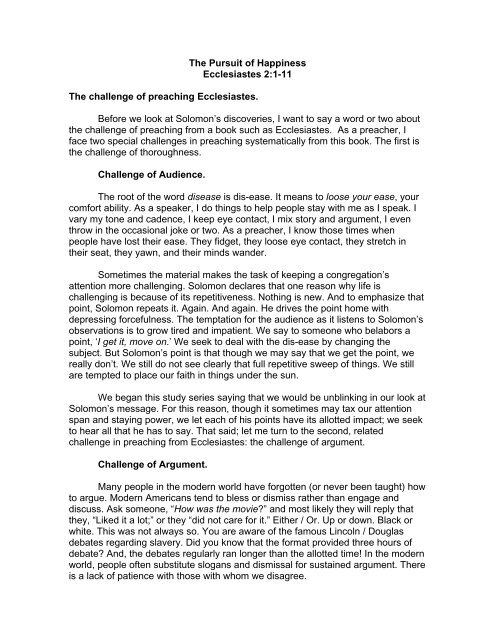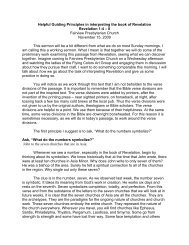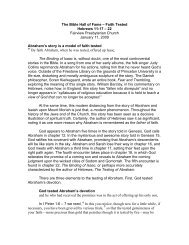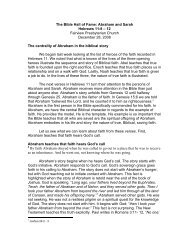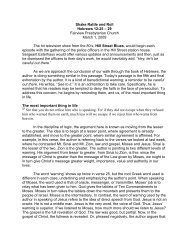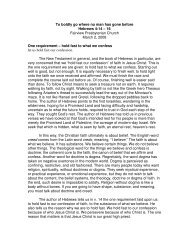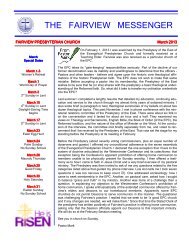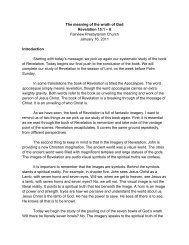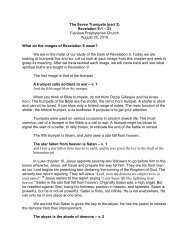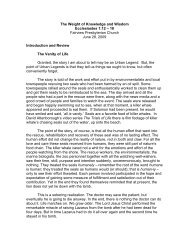The Pursuit of Happiness Ecclesiastes 2:1-11 The challenge of ...
The Pursuit of Happiness Ecclesiastes 2:1-11 The challenge of ...
The Pursuit of Happiness Ecclesiastes 2:1-11 The challenge of ...
You also want an ePaper? Increase the reach of your titles
YUMPU automatically turns print PDFs into web optimized ePapers that Google loves.
<strong>The</strong> <strong>Pursuit</strong> <strong>of</strong> <strong>Happiness</strong><br />
<strong>Ecclesiastes</strong> 2:1-<strong>11</strong><br />
<strong>The</strong> <strong>challenge</strong> <strong>of</strong> preaching <strong>Ecclesiastes</strong>.<br />
Before we look at Solomon’s discoveries, I want to say a word or two about<br />
the <strong>challenge</strong> <strong>of</strong> preaching from a book such as <strong>Ecclesiastes</strong>. As a preacher, I<br />
face two special <strong>challenge</strong>s in preaching systematically from this book. <strong>The</strong> first is<br />
the <strong>challenge</strong> <strong>of</strong> thoroughness.<br />
Challenge <strong>of</strong> Audience.<br />
<strong>The</strong> root <strong>of</strong> the word disease is dis-ease. It means to loose your ease, your<br />
comfort ability. As a speaker, I do things to help people stay with me as I speak. I<br />
vary my tone and cadence, I keep eye contact, I mix story and argument, I even<br />
throw in the occasional joke or two. As a preacher, I know those times when<br />
people have lost their ease. <strong>The</strong>y fidget, they loose eye contact, they stretch in<br />
their seat, they yawn, and their minds wander.<br />
Sometimes the material makes the task <strong>of</strong> keeping a congregation’s<br />
attention more challenging. Solomon declares that one reason why life is<br />
challenging is because <strong>of</strong> its repetitiveness. Nothing is new. And to emphasize that<br />
point, Solomon repeats it. Again. And again. He drives the point home with<br />
depressing forcefulness. <strong>The</strong> temptation for the audience as it listens to Solomon’s<br />
observations is to grow tired and impatient. We say to someone who belabors a<br />
point, ‘I get it, move on.’ We seek to deal with the dis-ease by changing the<br />
subject. But Solomon’s point is that though we may say that we get the point, we<br />
really don’t. We still do not see clearly that full repetitive sweep <strong>of</strong> things. We still<br />
are tempted to place our faith in things under the sun.<br />
We began this study series saying that we would be unblinking in our look at<br />
Solomon’s message. For this reason, though it sometimes may tax our attention<br />
span and staying power, we let each <strong>of</strong> his points have its allotted impact; we seek<br />
to hear all that he has to say. That said; let me turn to the second, related<br />
<strong>challenge</strong> in preaching from <strong>Ecclesiastes</strong>: the <strong>challenge</strong> <strong>of</strong> argument.<br />
Challenge <strong>of</strong> Argument.<br />
Many people in the modern world have forgotten (or never been taught) how<br />
to argue. Modern Americans tend to bless or dismiss rather than engage and<br />
discuss. Ask someone, “How was the movie?” and most likely they will reply that<br />
they, “Liked it a lot;” or they “did not care for it.” Either / Or. Up or down. Black or<br />
white. This was not always so. You are aware <strong>of</strong> the famous Lincoln / Douglas<br />
debates regarding slavery. Did you know that the format provided three hours <strong>of</strong><br />
debate? And, the debates regularly ran longer than the allotted time! In the modern<br />
world, people <strong>of</strong>ten substitute slogans and dismissal for sustained argument. <strong>The</strong>re<br />
is a lack <strong>of</strong> patience with those with whom we disagree.
If my assessment <strong>of</strong> the modern world is accurate, you can see the<br />
<strong>challenge</strong> in studying a book such as <strong>Ecclesiastes</strong>. In it Solomon is presenting a<br />
sustained effort to think clearly and insightfully on a single topic: where is<br />
satisfaction and meaning in life to be found? Because it is a sustained argument,<br />
we do not arrive quickly at Solomon’s answer. <strong>The</strong>re is the getting through parts<br />
that we have to get through. Solomon is going to look at all the possible answers<br />
the world gives before he gets around to giving the answer he proposes. This<br />
means we have to stick with it. We have to follow the argument patiently. This is<br />
the third message in the series and so far each has been a series <strong>of</strong> demolitions as<br />
Solomon has considered possible answers to his quest only to discard them as<br />
vain, repetitious and unfruitful. Why does Solomon argue in this way? It is only<br />
after a long walk in a desert that you begin to comprehend how precious and sweet<br />
fresh water really is.<br />
Solomon's search for life's meaning in pleasure<br />
I thought in my heart, “Come now, I will test you with pleasure to find out what is good.”<br />
In the closing verses <strong>of</strong> chapter 1, in his quest for meaning, Solomon<br />
explored the pleasures <strong>of</strong> the intellect. This week, in these verses from chapter 2,<br />
he explores the pleasures <strong>of</strong> the senses. Many in our world believe that this is<br />
where ultimate satisfaction will be found, in the pleasures <strong>of</strong> life. Many think that if<br />
only life could be a never ending spring break; if we could only find a way to live at<br />
the Magic Kingdom; if only life could be all vacation and no work; then we would<br />
find satisfaction. So Solomon goes <strong>of</strong>f on a systematic tour <strong>of</strong> the potential places<br />
where pleasure can be found in life to see if an abundance <strong>of</strong> such experience<br />
could bring joy and satisfaction to his heart.<br />
<strong>The</strong> first place he stops is mirth, laughter, comedy.<br />
Mirth<br />
2<br />
“Laughter,” I said, “is foolish. And what does pleasure accomplish?”<br />
Someone once said that there are three types <strong>of</strong> discovery in life. <strong>The</strong>re is<br />
the discover <strong>of</strong> beauty – aaah. <strong>The</strong>re is the discovery <strong>of</strong> science – ah hah! Thirdly,<br />
there is the discovery <strong>of</strong> comedy – ha ha. This is the pleasure <strong>of</strong> our fancy, <strong>of</strong><br />
laughing at the world and seeing its folly. Laughter is an important thing. It has its<br />
place in life.<br />
But laughter alone cannot bring joy to life any more than a laugh track on a<br />
television show means that what has been said or done is really funny. Sadly,<br />
comedy today is increasingly crude and lewd; making clear that, when it comes to<br />
a search for meaning and fulfillment, this option has died on stage.<br />
Food and Drink<br />
3<br />
I tried cheering myself with wine,
<strong>The</strong> next thing Solomon considers is his palate: the possibility <strong>of</strong> food and<br />
drink bringing fulfillment. He may have in mind not just the taste <strong>of</strong> food and drink,<br />
but the ambiance that can accompany the enjoyment <strong>of</strong> such pleasures: the<br />
backyard grill out; the five star restaurant; popcorn and peanuts at a ball game.<br />
Nearly everyone, I think, has certain comfort foods: food we eat when depressed,<br />
foods that remind us <strong>of</strong> home or happy times.<br />
Food is a good thing. It is remarkable the manner in which we humans can<br />
take the raw food God provides us in nature and, through preparation, spices,<br />
cooking, sauces and artistic presentation create works <strong>of</strong> culinary art. We do not<br />
just eat, we create through our cooking. For this reason, the best chefs can make<br />
an occupation based upon their cooking skill. But making a living and defining<br />
ultimate reality are not the same thing. Solomon knows that, in spite <strong>of</strong> all the<br />
pleasure eating and drinking can provide us in life, meaning will not be found there.<br />
Those who seek to find fulfillment in food and drink simply become gluttons.<br />
Frivolity<br />
and embracing folly—my mind still guiding me with wisdom. I wanted to see what<br />
was worthwhile for men to do under heaven during the few days <strong>of</strong> their lives.<br />
Some folk embrace life by not taking it seriously. <strong>The</strong> Atkinson family are<br />
great fans <strong>of</strong> the stories <strong>of</strong> P. G. Wodehouse, especially those revolving around the<br />
characters Jeeves and Bertie Wooster. At the same time, a legitimate criticism <strong>of</strong><br />
Wodehouse’s stories can be made from the fact that out <strong>of</strong> the ninety plus books<br />
he wrote during his life, not one ever deals with anything serious. In the end,<br />
Wodehouse is guilty <strong>of</strong> approaching life frivolously. Some people deal with life by<br />
not taking it seriously. <strong>The</strong>se folk live on the surface <strong>of</strong> life. For these folks, the<br />
spiritual and unseen world is a complete unknown. <strong>The</strong>y never talk about deep<br />
subjects, never engage in spirited debate. <strong>The</strong>se folk know how to talk only about<br />
themselves, what they have done or what has happened to them. Solomon<br />
considered the possibility <strong>of</strong> leading a life <strong>of</strong> whimsy. Maybe the solution to<br />
satisfaction is to not take life seriously: to whole heartedly embrace lightness and<br />
fluff.<br />
<strong>The</strong> difficulty, <strong>of</strong> course, is that sooner or later, the trauma, tragedy and pain<br />
<strong>of</strong> life must be seen. It must be acknowledged, and the verdict will be rendered<br />
that this too was vanity.<br />
So far Solomon has pondered laughter, food and drink, and whimsy as<br />
possible sources <strong>of</strong> fulfillment. Next, he considers duty.<br />
Duty<br />
4<br />
I undertook great projects:<br />
In a James Bond movie there is a scene in which Bond, <strong>of</strong>f on one <strong>of</strong> his<br />
many improbable adventures, takes the initiative, going beyond what his handlers<br />
had asked <strong>of</strong> him. One supervisor sneers out the question, “what does he think he
is doing?’ Bond’s boss, M, replies simply, ‘his job.’ This is a popular movie myth<br />
that doing one’s job, doing one’s duty, is all that is needed to find meaning,<br />
fulfillment and satisfaction in life. Solomon tells us in this phrase that he pursued<br />
‘great projects.’ <strong>The</strong> idea is that he gave himself to the pursuit <strong>of</strong> accomplishment,<br />
seeking the sense <strong>of</strong> pr<strong>of</strong>ound satisfaction that arises from knowledge <strong>of</strong> a job well<br />
done. It is the pleasure that accompanies a soldier when he hears the words<br />
‘mission accomplished.’<br />
Solomon knows that it takes more. In addition to duty, he also builds<br />
memorials.<br />
Monuments<br />
I built houses for myself<br />
Ambrose Bierce, in his Devils Dictionary, points out that a mausoleum is the<br />
final and funniest folly <strong>of</strong> the rich. One <strong>of</strong> the primary functions <strong>of</strong> colleges and<br />
universities these days is to provide opportunities for the rich to name things after<br />
themselves. Moving to Pennsylvania three years ago I met clergy colleagues who<br />
had graduated from Palmer Seminary. I had never heard <strong>of</strong> Palmer Seminary.<br />
<strong>The</strong>n I learned that the Palmer family gave a lot <strong>of</strong> money to Eastern Baptist<br />
Seminary – which I certainly had heard <strong>of</strong> – and so they renamed the institution.<br />
You give the money and the university will be happy to slap your name on the<br />
outside. Solomon understood the desire. He built things too. All <strong>of</strong> the things he<br />
built lie in ruins and are gone.<br />
Gardening and Water Works<br />
and planted vineyards. 5 I made gardens and parks and planted all kinds <strong>of</strong> fruit trees<br />
in them..<br />
6<br />
I made reservoirs to water groves <strong>of</strong> flourishing trees.<br />
It is hot in the Middle East. Shade trees, reservoirs and flowing water are<br />
precious things that provide relief from the heat, escape from the sun and water for<br />
the parched and thirsty. Solomon is not writing about water parks, log flume rides<br />
or beaches. He is talking about public service, planning ahead on how to gather in<br />
reservoirs precious rainwater when it comes and how to plant and water precious<br />
shade trees to provide relief from the long summer sun. Maybe satisfaction will be<br />
found in pursuing public works, doing good deeds, putting in the effort to make the<br />
world a better place.<br />
I read the story <strong>of</strong> a man who had a truly outstanding flower garden, full <strong>of</strong><br />
ornamental plants and exotic flowers, arranged in patterns pleasing to the eye and<br />
satisfying to soul. He was working in it one day when a neighbor happened by for a<br />
visit. <strong>The</strong> neighbor, looking at all the patterned beauty around him in the garden,<br />
declared, “what a great job you and the Lord have done with this garden.’ His<br />
friend thought for a moment and said, ‘well, you should have seen it when the good<br />
Lord was watching out for himself.’ Solomon understood: the fruit trees must be
pruned; the bugs must be sprayed; the plants arranged; the rows weeded; and the<br />
work is never ending. Fulfillment will not be found in growing things.<br />
Next, Solomon wonders if maybe the search can be fulfilled more closely to<br />
home.<br />
Household Management<br />
7<br />
I bought male and female slaves and had other slaves who were born in my house.<br />
<strong>The</strong>re is a sense <strong>of</strong> satisfaction that comes from successfully managing a<br />
household. It follows that the larger the household one manages, the more<br />
satisfaction one can obtain. Households today, especially in Europe and North<br />
America, tend to be single family. In nations where the cost <strong>of</strong> labor is cheap, a<br />
household may include a maid, gardener, or nanny. <strong>The</strong> rich today manage<br />
households <strong>of</strong> multiple people. Every newly minted rock star wants his own retinue,<br />
that group <strong>of</strong> flunkies and hangers on who accompany him and who, by their<br />
presence, show to the world the rock star’s importance. <strong>The</strong> successful<br />
management <strong>of</strong> a household is an important and challenging skill, but it is not a<br />
road to fulfillment. Solomon looks upon this and says, ‘been there: done that.’<br />
Next, Solomon considers if fulfillment can be found by being the best, by<br />
being number one.<br />
Being Number One<br />
I also owned more herds and flocks than anyone in Jerusalem before me.<br />
<strong>The</strong> accent in this phrase falls upon the word more: Solomon had more<br />
possessions, more <strong>of</strong> the obvious evidence <strong>of</strong> accomplishment in life, than any<br />
who had come before him. I saw a bumper sticker one time that said, ‘He who dies<br />
with the most toys wins.’ Wins what, I wondered? Some think that satisfaction will<br />
be found in winning the race to acquire things; to keep up with the Jones’, or to rise<br />
to the top <strong>of</strong> your game. Yet in our world the frequent reports <strong>of</strong> celebrities<br />
checking themselves into rehabilitation clinics makes clear that fame is not all it is<br />
believed to be. <strong>The</strong>re was a movie in the 80’s titled Fame. <strong>The</strong> words <strong>of</strong> the title<br />
song, sung by Irene Cara, declared “Fame! I’m gonna live forever.” No, you are<br />
not. Ask Michael Jackson, Farah Fawcet, or Karl Malden.<br />
Solomon next considers wealth.<br />
Wealth and Rarities<br />
I amassed silver and gold for myself, and the treasure <strong>of</strong> kings and provinces.<br />
Solomon did not just have cattle and flocks, he had gold and silver too.<br />
Gobs <strong>of</strong> it. In James Clavel’s novel Nobel House several characters talk about their<br />
desire to have ‘drop dead money.’ What they mean is to have so much money that<br />
they are independently free from all restraint or obligation: free to say ‘drop dead’<br />
to anything or anyone who fails to please them. Some believe that life’s fulfillment
will come with complete, total, and absolute financial freedom. This too is a myth.<br />
Some people have their drop dead money. <strong>The</strong>y have complete financial freedom,<br />
possessing more money than they know what to do with. Some <strong>of</strong> the richest<br />
individuals in our world are richer than some nations. When you get to that level <strong>of</strong><br />
wealth, is there anything more you can possible desire? Solomon knew. Wealth<br />
alone, even great wealth, does not finally satisfy. You begin to look for other things<br />
upon which to set your heart. <strong>The</strong> reference here is not just to the number <strong>of</strong> toys<br />
you die with, but their rarity: the Faberge egg, the original Rembrandt, or the<br />
Lamborghini. Solomon knows that money does not change the inward person.<br />
<strong>The</strong>re are many who have all the wealth they desire, and the rarities to accompany<br />
it, yet are still inwardly unfulfilled and spiritually empty.<br />
Lastly, Solomon looks towards music.<br />
Music<br />
I acquired men and women singers, and musical instruments as well<br />
Solomon filled his home with musicians and singers and musical<br />
instruments. <strong>The</strong> food, the riches, the accomplishments, the precious things he has<br />
listed so far have not filled the void in his heart. Perhaps what was needed was a<br />
different sensory vehicle: the ear. Music has the ability to carry emotion and<br />
provoke memory. Perhaps music would fill his soul and satisfy its longing. He<br />
brought into his household the finest musicians and singers to inspire and distract<br />
him in his days. Today we might seek to buy the best home theater system. This<br />
too, proved ultimately unsatisfactory, for music, even great music, ceases to exist<br />
as soon as it has ceased to sound. Like looking in a mirror and then turning a way,<br />
when the music stops, it ceases; neither can it fill the vacuum in the soul.<br />
Solomon’s thought, effort, and actions lead him to pronounce a verdict on<br />
the possibility <strong>of</strong> finding meaning and satisfaction in the sensory pleasures <strong>of</strong> life.<br />
Solomon's verdict<br />
10<br />
I denied myself nothing my eyes desired;<br />
I refused my heart no pleasure.<br />
My heart took delight in all my work,<br />
and this was the reward for all my labor.<br />
<strong>11</strong><br />
Yet when I surveyed all that my hands had done<br />
and what I had toiled to achieve,<br />
everything was meaningless, a chasing after the wind;<br />
nothing was gained under the sun.<br />
Do you know the Legend <strong>of</strong> the Wandering Jew? As the legend has it, there<br />
was a Jewish man who, while watching the Lord Jesus carry his cross, mocked<br />
him. This man is then condemned to wander the earth until Judgment Day. In the<br />
version I know, the wanderer’s name is Ahasuerus. <strong>The</strong> punishment he bears is<br />
not what we might at first think it to be. Ahasuerus is the ultimate expression <strong>of</strong> the<br />
attitude – “been there, done that.” He wanders the earth, aimlessly, having been
everywhere and done everything; nothing satisfies; nothing is new. Like the cursed<br />
pirates in the movie Pirates <strong>of</strong> the Caribbean, he cares for nothing, he feels<br />
nothing, and he enjoys nothing.<br />
At the end <strong>of</strong> the six days <strong>of</strong> creation, God looked out upon all that he had<br />
made and he declared “behold it was very good.” Solomon, after searching through<br />
all <strong>of</strong> God’s creation, looks out upon it and he declares, “behold it is all vanity.”<br />
Nothing met his expectation. Nothing satisfies his soul. Nothing brings fulfillment.<br />
Put him up on the stage to sing a duet with Mick Jagger: “I can’t get no<br />
satisfaction.”<br />
Where does Solomon's search take place? “Under the Sun”<br />
Before we grow too depressed over where Solomon’s quest has taken us, I<br />
need to add a contextual word about jurisdiction. Jurisdiction refers to the sphere in<br />
which an authority is valid. It refers to the limits <strong>of</strong> a territory. We live in the<br />
commonwealth <strong>of</strong> Pennsylvania, part <strong>of</strong> the United States <strong>of</strong> America. This is our<br />
jurisdiction. This identifies the laws we live under and the loyalties we affirm.<br />
Where does Solomon’s search take place? What jurisdiction is he under?<br />
He tells us explicitly. Solomon’s jurisdiction is ‘under the sun.’ This is where his<br />
verdict is rendered: ‘under the sun.’ This is the jurisdiction in which his verdict is<br />
true: “under the sun.” Solomon declares that if you search in creation, this is what<br />
you find: all is vanity. <strong>The</strong>re is no pr<strong>of</strong>it under that sun. No satisfaction or fulfillment<br />
will be found in creation.<br />
What is missing?<br />
What is the limitation in Solomon’s jurisdiction? What is missing from his<br />
observation? Or better, who is missing? God. Solomon’s inquiry has been a wholly<br />
secular inquiry. All he has done so far is apart from and independent <strong>of</strong> God. It is<br />
independent <strong>of</strong> any and all spiritual truth or guidance. Solomon has described for<br />
us what you get if you try to search for life’s meaning without God. Carl Sagan, the<br />
atheist physicist asked <strong>of</strong> the universe, ‘is it Cosmos or Chaos?’ Without God, it is<br />
chaos. Chaos is what you get if you seek to construct the meaning <strong>of</strong> your world<br />
without God.<br />
<strong>The</strong> most famous song out <strong>of</strong> the classic movie <strong>The</strong> Wizard <strong>of</strong> Oz is<br />
Somewhere over the Rainbow. Lost in the chaos <strong>of</strong> the Land <strong>of</strong> Oz, Dorothy knows<br />
that there must be a place that will bring the fulfillment and satisfaction she longs<br />
for in life. Dorothy wants to go home. She knows that home will not be found in Oz.<br />
Is there a place beyond what she sees? Is there a place that is not under the sun<br />
<strong>of</strong> Oz? Is there a place beyond this?<br />
<strong>The</strong> Christian answer is that this world is not all there is to life. In the Nicene<br />
Creed we confess that we believe in all that is, seen and unseen. An important<br />
confession that. <strong>The</strong> world is not all there is to life. Life under the sun is not all that
matters. <strong>The</strong>re is an unseen world that provides the spiritual nourishment we need<br />
to find hope, purpose and meaning in our world. This is the world that is pointed to<br />
in the message <strong>of</strong> the gospel <strong>of</strong> Christ. As Paul writes in the opening chapter <strong>of</strong> his<br />
letter to Ephesus, 3 Blessed be the God and Father <strong>of</strong> our Lord Jesus Christ, who<br />
has blessed us in Christ with every spiritual blessing in the heavenly places, 4 even<br />
as he chose us in him before the foundation <strong>of</strong> the world, that we should be holy and<br />
blameless before him. 1<br />
As we close, let me ask, ‘whose jurisdiction are you living under today?’ Are<br />
you living simply ‘under the sun,’ in a world where God is missing, unimportant,<br />
ignored? You can try to live there. Many do. But Solomon makes clear that in the<br />
end, that jurisdiction is a dry and parched land.<br />
If you want to find meaning and purpose in life, look to God. Turn to God as<br />
he is revealed to us in the person <strong>of</strong> Jesus Christ. Jesus Christ is the key. He is the<br />
one who gives life its meaning. He is the one who, through faith in him, enables us<br />
to claim and enjoy all the true pleasures <strong>of</strong> life.<br />
Say 'Amen' Somebody<br />
1<br />
<strong>The</strong> Holy Bible : English standard version. 2001 (Eph 1:3-4). Wheaton: Standard Bible Society.
I thought in my heart, “Come now, I will test you with pleasure to find out what is good.”<br />
But that also proved to be meaningless. 2 “Laughter,” I said, “is foolish. And what does<br />
pleasure accomplish?” 3 I tried cheering myself with wine, and embracing folly—my mind<br />
still guiding me with wisdom. I wanted to see what was worthwhile for men to do under<br />
heaven during the few days <strong>of</strong> their lives.<br />
4<br />
I undertook great projects: I built houses for myself and planted vineyards. 5 I made<br />
gardens and parks and planted all kinds <strong>of</strong> fruit trees in them. 6 I made reservoirs to water<br />
groves <strong>of</strong> flourishing trees. 7 I bought male and female slaves and had other slaves who<br />
were born in my house. I also owned more herds and flocks than anyone in Jerusalem<br />
before me. 8 I amassed silver and gold for myself, and the treasure <strong>of</strong> kings and provinces. I<br />
acquired men and women singers, and a harem a as well—the delights <strong>of</strong> the heart <strong>of</strong> man. 9<br />
I became greater by far than anyone in Jerusalem before me. In all this my wisdom stayed<br />
with me.<br />
10<br />
I denied myself nothing my eyes desired;<br />
I refused my heart no pleasure.<br />
My heart took delight in all my work,<br />
and this was the reward for all my labor.<br />
<strong>11</strong><br />
Yet when I surveyed all that my hands had done<br />
and what I had toiled to achieve,<br />
everything was meaningless, a chasing after the wind;<br />
nothing was gained under the sun.<br />
a <strong>The</strong> meaning <strong>of</strong> the Hebrew for this phrase is uncertain.


